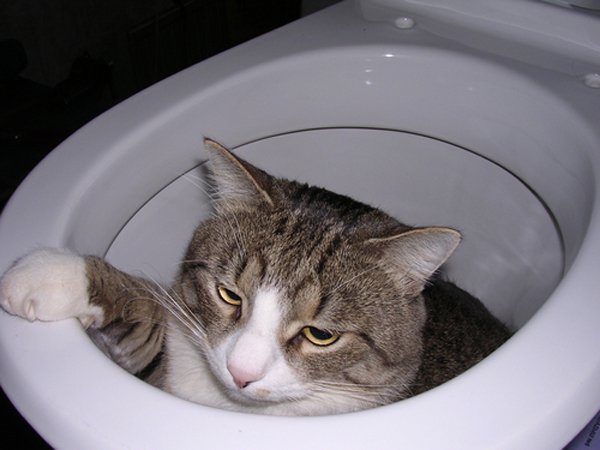Avoid Clogs and Damage: Never Flush Cat Poop Down Your Toilet - Professional Insights
Avoid Clogs and Damage: Never Flush Cat Poop Down Your Toilet - Professional Insights
Blog Article
We have uncovered this great article on Can You Flush Cat Poo or Litter Down the Toilet? down the page on the web and decided it made perfect sense to talk about it with you on my blog.

Introduction
As feline proprietors, it's vital to be mindful of how we take care of our feline pals' waste. While it may appear hassle-free to purge pet cat poop down the commode, this practice can have detrimental repercussions for both the environment and human health.
Alternatives to Flushing
The good news is, there are much safer and more accountable means to throw away pet cat poop. Consider the complying with options:
1. Scoop and Dispose in Trash
The most typical approach of getting rid of feline poop is to scoop it right into a biodegradable bag and toss it in the trash. Make sure to use a committed trash scoop and throw away the waste quickly.
2. Use Biodegradable Litter
Select biodegradable cat litter made from materials such as corn or wheat. These litters are eco-friendly and can be securely disposed of in the garbage.
3. Hide in the Yard
If you have a backyard, consider hiding pet cat waste in an assigned area away from veggie gardens and water resources. Make sure to dig deep sufficient to avoid contamination of groundwater.
4. Mount a Pet Waste Disposal System
Buy a pet dog waste disposal system especially developed for pet cat waste. These systems utilize enzymes to break down the waste, decreasing smell and environmental impact.
Health and wellness Risks
In addition to environmental worries, flushing feline waste can likewise posture health dangers to people. Pet cat feces may contain Toxoplasma gondii, a parasite that can trigger toxoplasmosis-- a possibly extreme illness, particularly for pregnant women and individuals with weakened immune systems.
Ecological Impact
Purging feline poop introduces dangerous virus and bloodsuckers right into the water, positioning a significant risk to marine ecological communities. These impurities can adversely affect marine life and compromise water top quality.
Conclusion
Responsible family pet ownership prolongs past giving food and sanctuary-- it additionally includes appropriate waste monitoring. By avoiding purging pet cat poop down the commode and choosing alternate disposal approaches, we can lessen our environmental impact and protect human wellness.
Why You Should Never Flush Cat Poop Down the Toilet
A rose by any other name might smell as sweet, but not all poop is created equal. Toilets, and our sewage systems, are designed for human excrement, not animal waste. It might seem like it couldn’t hurt to toss cat feces into the loo, but it’s not a good idea to flush cat poop in the toilet.
First and foremost, assuming your cat uses a litter box, any waste is going to have litter on it. And even the smallest amount of litter can wreak havoc on plumbing.
Over time, small amounts build up, filling up your septic system. Most litter sold today is clumping; it is made from a type of clay that hardens when it gets wet. Ever tried to scrape old clumps from the bottom of a litter box? You know just how cement-hard it can get!
Now imagine just a small clump of that stuck in your pipes. A simple de-clogger like Drano isn’t going to cut it. And that means it’s going to cost you big time to fix it.
Parasitic Contamination
Believe it or not, your healthy kitty may be harboring a nasty parasite. Only cats excrete Toxoplasma in their feces. Yet it rarely causes serious health issues in the cats that are infected. Most people will be fine too if infected. Only pregnant women and people with compromised immune systems are at risk. (If you’ve ever heard how women who are expecting are excused from litter cleaning duty, Toxoplasma is why.)
But other animals may have a problem if infected with the parasite. And human water treatment systems aren’t designed to handle it. As a result, the systems don’t remove the parasite before discharging wastewater into local waterways. Fish, shellfish, and other marine life — otters in particular — are susceptible to toxoplasma. If exposed, most will end up with brain damage and many will die.
Depending on the species of fish, they may end up on someone’s fish hook and, ultimately on someone’s dinner plate. If that someone has a chronic illness, they’re at risk.
Skip the Toilet Training
We know there are folks out there who like to toilet train their cats. And we give them props, it takes a lot of work. But thanks to the toxoplasma, it’s not a good idea.

As a fervent person who reads on How to Dispose of Cat Poop and Litter Without Plastic Bags, I figured sharing that chunk was a great idea. Loved our write up? Please share it. Let someone else locate it. Many thanks for taking the time to read it.
Browse Our Site Report this page